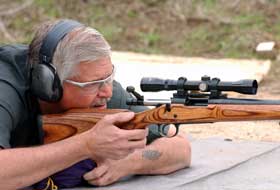This interview with the lead attorney on Heller is definitely worth reading:
One key unresolved question in D.C. v. Heller is whether it limits the states as well as the federal government. The Bill of Rights originally restrained only Congress, but under the "incorporation" doctrine, the Supreme Court has held that the 14th Amendment protects most constitutional rights against state encroachment. Because the capital is a federal district, its local government is a creation of the U.S. Congress. Heller gave no reason to think incorporation doesn't apply, but further litigation will be necessary to settle the question.
Nor does Heller settle which restrictions are constitutional and which are not. Justice Scalia wrote that "nothing in our opinion should be taken to cast doubt" on laws against possession of firearms by felons or the mentally ill or in "sensitive places" like schools or government buildings, or laws regulating commerce in firearms. That's fine with Mr. Gura, but many laws currently on the books fall somewhere between these uncontroversial provisions and D.C.'s onerous restrictions.
These questions will be sorted out in litigation to come. Mr. Gura's first stop: Chicago, which has a handgun ban identical to Washington's and burdensome registration requirements for long guns.
The Chicago lawsuit was "ready to go" when the Supreme Court decided Heller on June 26. "I looked at the opinion," Mr. Gura says, "and I called my counsel in Chicago and said, 'Yeah, looks good.'" The next day another lawsuit was filed, challenging the ban on handguns in San Francisco's public housing projects. Among the plaintiffs: the National Rifle Association. Thanks to Mr. Gura's efforts, the NRA is no longer gun-shy about going to court.
Saturday, July 19, 2008
Great OpinionJournal Interview with Alan Gura
Subscribe to:
Post Comments (Atom)






2 comments:
Hi Michael,
One of the things I'm concerned about is the future of machinegun ownership . Buying new machineguns is already banned, but I wondering if the courts will decide that current ownership can be banned because these weapons are "dangerous and unusual". Also, Mr. Gura hedged in the oral arguments in DC vs. Heller on this issue and that lead me to believe he or the Court believes there is room to restrict them or ban them.
Your thoughts on the future of machinegun ownership?
-George
Jacksonville, FL
George,
Any challenge to the NFA will have to include a couple of things from heller. one would be establishing them to be "dangerous and unusual" another would be "in common use" and any licensing scheme cannot be "arbitrary and capricious"
my suspicion is that a challenge to the NFA will come out in one or two ways. first would be a challenge based on the fact that the only reason that machine guns are not "in common use" are because of a series of unconstitutional laws that took them out of common use.
Secondly, a challenge on the signature of CLEO requirements. Basically the fact that some CLEO's will sign the paper and others will not creates a "arbitrary and capricious" licensing scheme. Furthermore, there is a violation of the equal protection clause. The fact that one county's residents can get the signature and another's cannot.
I suspect that those two challenges will be successful, any further challenges to the NFA would have to be done carefully.
I think that most of us in the gun world would be fine with the NFA so long as the Hughes amendment were lifted and the CLEO signature would become a shall issue not a may issue.
Post a Comment